

Manchester and Leeds: Could they rival London? 23 June 2014Last updated at 10:06 ET A train from Manchester to Leeds currently takes about 50 minutes The chancellor has set out his vision for an economic "powerhouse" in the north of England but could Manchester, Leeds and other northern cities link up to rival London?
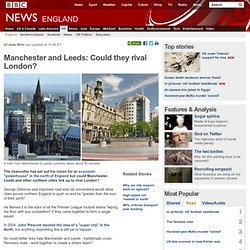
George Osborne said improved road and rail connections would allow cities across northern England to push on and be "greater than the sum of their parts". He likened it to the stars of all the Premier League football teams "wiping the floor with any competition" if they came together to form a single squad. Is Tourism Ruining Barcelona? - Feargus O'Sullivan. The case for making Hebden Bridge the UK's second city.
9 March 2014Last updated at 20:10 ET By Evan Davis BBC News Birmingham and Manchester are usually mentioned when the subject of Britain's second city comes up.
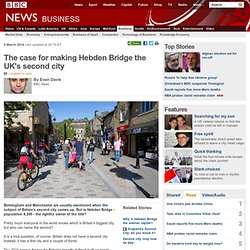
But is Hebden Bridge - population 4,200 - the rightful owner of the title? Pretty much everyone in the world knows which is Britain's biggest city, but who can name the second? It is a trick question, of course. The 2011 census figures for Britain's broadly defined built-up areas, ranked by population, show that Greater London comes first with 9.8 million. That makes it as big as the next six urban areas put together - Greater Manchester (2.5m), the West Midlands (2.4m), West Yorkshire (1.8m), Greater Glasgow and Clyde (1.2m), Liverpool (0.9m) and South Hampshire (0.9m). Drawing on that list, Manchester and Birmingham offer the best candidates for second city status, but each is still only a quarter of the size of the capital and its sprawling urban area. Hebden Bridge: West Yorkshire's cool and quirky corner. London's cheapest suburb? It's Barcelona. Barcelona by night, 'Gherkin' building included.
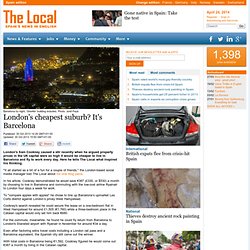
Photo: Jordi Payà Published: 30 Oct 2013 14:26 GMT+01:00Updated: 30 Oct 2013 15:50 GMT+01:00 London's Sam Cookney caused a stir recently when he argued property prices in the UK capital were so high it would be cheaper to live in Barcelona and fly to work every day. Here he tells The Local what inspired his thinking. "It all started as a bit of a fun for a couple of friends," the London-based social media manager told The Local about his viral blog piece. In his article, Cookney demonstrated he would save €387 (£330, or $530) a month by choosing to live in Barcelona and commuting with the low-cost airline Ryainair to London four days a week for work. To "compare apples with apples" he chose to line up Barcelona’s upmarket Les Corts district against London’s pricey West Hampstead. For the commute, meanwhile, he found he could fly return from Barcelona to London's Stansted airport with Ryanair in November for around €34 a day.
"I love Barcelona. Why Paris? Let’s dispense with the romance of Paris.
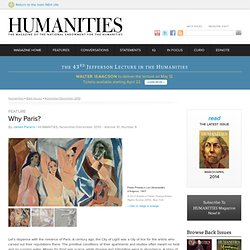
A century ago, the City of Light was a city of lice for the artists who carved out their reputations there. The primitive conditions of their apartments and studios often meant no heat and no running water. Money for food was scarce, while disease and infestation were in abundance. Luxembourg's hopping heritage. 2 September 2013Last updated at 20:35 ET By Nina Lamparski BBC News, Echternach Luxembourg is one of Europe's smallest countries, bordered by two of its largest - Germany and France.
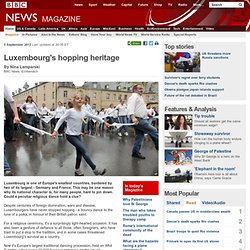
This may be one reason why its national character is, for many people, hard to pin down. Could a peculiar religious dance hold a clue? Despite centuries of foreign domination, wars and disease, Luxembourgers have never stopped hopping - a bouncy dance to the tune of a polka, in honour of their British patron saint. For a religious ceremony, it's a surprisingly light-hearted occasion. Now it's Europe's largest traditional dancing procession, held on Whit Tuesday, when some 10,000 hoppers converge on the city of Echternach, along with up to 40,000 spectators. The hero of the occasion is St Willibrord, the so-called Apostle of Benelux, an Anglo-Saxon missionary from Ripon in North Yorkshire, who is credited with driving paganism out of Belgium, the Netherlands and Germany in the 8th Century.
“Start Quote. Open House London: The 'mad' idea that went global. 21 September 2013Last updated at 03:06 ET By Josephine McDermott BBC News.
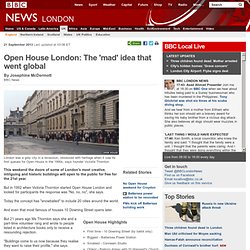
Open-City the architecture education organisation. Rural France: A tale of two villages. 6 August 2013Last updated at 19:08 ET By Emma Jane Kirby BBC News, France One in five homeowners in Aubeterre-sur-Dronne is now British The notion of cosy, colourful village life has long drawn visitors to France but the reality can be very different.
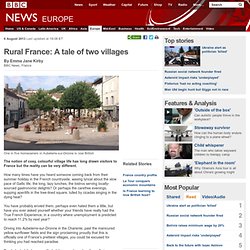
How many times have you heard someone coming back from their summer holiday in the French countryside, waxing lyrical about the slow pace of Gallic life, the long, lazy lunches, the bistros serving locally-sourced gastronomic delights? Or perhaps the carefree evenings, supping aperitifs in the tree-lined square, lulled by cicadas singing in the dying heat? You have probably envied them, perhaps even hated them a little, but have you ever asked yourself whether your friends have really had the True French Experience, in a country where unemployment is predicted to reach 11.2% by next year? Continue reading the main story “Start Quote.